|
|
|
Sort Order |
|
|
|
Items / Page
|
|
|
|
|
|
|
| Srl | Item |
| 1 |
ID:
175104
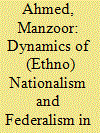

|
|
|
|
|
| Summary/Abstract |
The paper examines how an (ethno)nationalist movement developed and took shape in Balochistan in relation to a broader national question that ranges from seeking provincial autonomy within the federation of Pakistan to gaining independence and formation of a separate state of Balochistan. The paper also analyses the estranged relationship of Balochistan with the state of Pakistan against the background of the failure of the state in accommodating the Baloch national aspirations for economic, social and political rights, while adhering to the basic tenets of federalism. The Baloch, who sporadically engaged in armed conflicts with the state after the British left the Indian Subcontinent in 1947, were not merely the pawns of geopolitics. The conflict in Balochistan must also be seen in a greater context of nationalism as an effort of the Baloch elite to achieve more autonomy within the federal structure of Pakistan. The movement for more national autonomy under the slogan of nationalism may be understood as a tool to further consolidate the social, economic and political strengths of the traditional tribal structure of Balochistan, instead of a struggle for economic and political empowerment of the people of Balochistan. The genuine economic and political aspirations of the people were doubly constrained. On the one hand, the centuries old tribal-centric social structure impeded any social and political evolution in the province and, on the other hand, the limitations of the federal structure in Pakistan restrained Balochistan’s integration into the mainstream national polity and economy. The paper argues that the emergence of nationalism is shaped, firstly by the historical legacy of the colonial era, the identity politics of Baloch nationalists, resource-grabbing and hegemonic approach of the Baloch Sardars or tribal chieftains, and secondly by Pakistan’s failure in adhering to the principles of federalism. Extreme centralization or quasi federalism with its authoritarian nature has promoted regionalism and centrifugal tendencies. Balochistan being a periphery happened to be a fertile ground for the emergence and development of a nationalist movement against the attitudes of the state of Pakistan, which led towards a conflict situation between Balochistan and the state of Pakistan.
|
|
|
|
|
|
|
|
|
|
|
|
|
|
|
|
| 2 |
ID:
129441
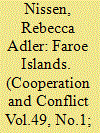

|
|
|
|
|
| Publication |
2014.
|
| Summary/Abstract |
This article examines the intersection of postimperial sovereignty and European integration in the context of a disintegrating Nordic empire. More specifically, it explores the relationships between the Faroe Islands - a group of self-governing islands in the North Atlantic - Denmark and the rest of the world. While the Faroe Islands have gained increased autonomy from Denmark, Faroese separatists are now discussing whether to transfer their newly won autonomy further on to the EU. This contradictory development of separation and integration is shaped by interweaving ideas of sovereignty, nationalism, globalization and postcolonial dependency. The article shows that the Faroese-Danish relationship is being internationalized and Europeanized as the EU and UN become reference points in negotiations of political visions for an independent Faroese state and the controversial issue of pilot whaling. Notwithstanding Dramatic Transformations, the Faroese-Danish relationship has maintained its postcolonial character, where Denmark is awkwardly constituted as a maternalistic colonial power defending an adolescent colonized from the rest of the world. The real novelty is not the increased Faroese autonomy from Denmark, but how the EU challenges the unity of the postimperial Danish realm and hence the myth of a homogenous Danish nation-state.
|
|
|
|
|
|
|
|
|
|
|
|
|
|
|
|
| 3 |
ID:
159803
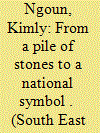

|
|
|
|
|
| Summary/Abstract |
Existing studies of the Cambodia-Thailand conflict over the Khmer temple of Preah Vihear tend to regard the temple as nationally significant to both countries. However, little is known about how the border temple complex has emerged from obscurity to symbolize the nation in Cambodian nationalist discourse. Therefore, this article seeks to examine the stakeholders, contexts, and specific political situations implicated in the emergence of the ancient temple as a site of national significance. It links the temple’s rise to national prominence in Cambodia to the broader context of Prince Norodom Sihanouk’s politics of postcolonial nation-building. I argue that Sihanouk had a strong stake in the temple and the conflict over it with Thailand. His investment in the project of nationalism in relation to the temple was an important resource in pursuing his wider political objectives in building the post-independence Cambodian nation.
|
|
|
|
|
|
|
|
|
|
|
|
|
|
|
|
| 4 |
ID:
131009
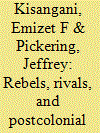

|
|
|
|
|
| Publication |
2014.
|
| Summary/Abstract |
A recent, notable strain of empirical research argues that postcolonial state-building follows a pattern similar to the European state-building experience. It acknowledges that war is less common today, but contends that interstate rivalry now drives state-building. We argue that postcolonial state-managers have little reason to build state capacity in response to rival states. There is only a slight chance that these rivalries will escalate into an existential threat for the government. Attention should instead be focused on the more tangible threat posed by transnational rebels and postcolonial governments' use of low-scale military force to combat such non-state actors. Using interrupted time series methodology on a sample of 72 countries from 1972 to 2002, we find that postcolonial state military intervention against transnational rebels increases direct taxes (a measure of state penetration) and non-tax revenue (state autonomy) collected by governments, while intervention against rival states reduces direct taxation.
|
|
|
|
|
|
|
|
|
|
|
|
|
|
|
|
| 5 |
ID:
159375
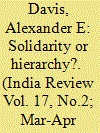

|
|
|
|
|
| Summary/Abstract |
The idea of solidarity between India and Africa has long drawn heavily from historical sources, including the anti-colonial legacies of Jawaharlal Nehru and Mahatma Gandhi, and ongoing frustration with a hierarchical world order that subordinates them from international decision-making. In this article, I consider the historical ambivalence embedded within the ways in which India now identifies with and talks about “Africa.” I argue that elements of the Modi government’s political project is changing the meaning of India’s identification with “Africa.” After a brief theoretical discussion and a consideration of the historical context, I look at two recent examples in which India’s relationship with Africa was narrated: the 2015 India–Africa Forum Summit and the recent furor over attacks on African students in India. This has already caused upset between India and specific African states. Although still premised on shared resistance to hierarchy, there are signs that the idea of “India-Africa relations” itself can become a hierarchical discourse.
|
|
|
|
|
|
|
|
|
|
|
|
|
|
|
|
|
|
|
|
|